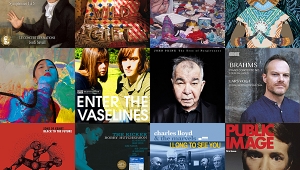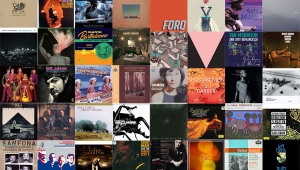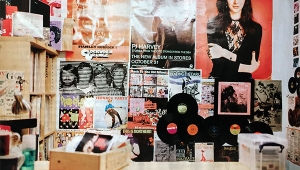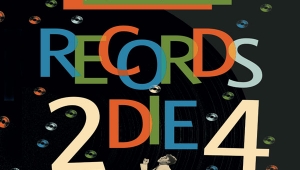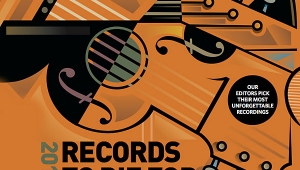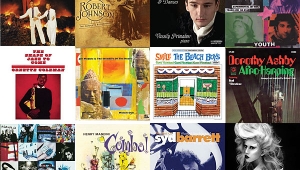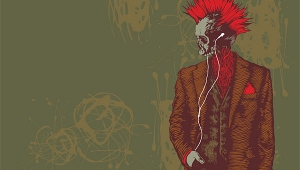| Columns Retired Columns & Blogs |
2004 Records To Die For Page 7
ROBERT J. REINA
GARY WILSON: Mary Had Brown Hair
Gary Wilson (no catalog number) (CD). 2003. Gary Wilson prod., eng. AAD. TT: 44:40. Available at www.sixpointfour.com.
In 2002, when now-defunct Motel Records tracked down eccentric jazz-pop composer and performance artist Gary Wilson after 20 years of seclusion, the result was a re-release of two CDs of his material from the mid- and late 1970s, a series of concerts, and a documentary film about his life. His resurgence inspired this new CD release of recent works, which follows the classic Wilson formula of quirky songs of unrequited love devoted to women of Wilson's past set against slick jazz-rock arrangements. These tunes, dominated by electronic percussion and synthesizer, are more dramatic and obsessive than his earlier work, and are replete with distorted guitars, pitch-shifted vocals, and odd, close-miked, Cagean breaking-of-piano-strings-as-percussion and string bass duets. Think of Burt Bacharach on acid. We're glad to have Wilson back with us.
THEY MIGHT BE GIANTS: No!
Idlewild/Rounder 618113 (CD). 2002. They Might Be Giants, prods.; Albert Caiati, Cosmos Heidtman, Stan Wright, Jason Spittle, engs. AAD? TT: 33:50
As I always found the music of They Might Be Giants rather childish, it seems fitting that they should release an album of original children's songs. This brilliantly composed, creatively arranged, and superbly engineered collection of 17 short tunes covering just about every conceivable rock genre strikes this composer-musician as the Giants' most innovative work to date. Here you'll find a few fairy tales, a creepy medieval ballad about a mausoleum in New Jersey, songs about robots and the origin of balloons, as well as the self-explanatory "Bed, Bed, Bed" and the title track. My eight- and three-year-old have each memorized much of the CD; they and my wife and I are all obsessed with this music.
ALICIA KEYS: The Diary of Alicia Keys
J Records 82876-57017-2 (CD). 2003. Alicia Keys, Timbaland, Easy Mo Bee, Dwayne Wiggins, Kane West, Kerry "Krucial" Brothers, Andre Harris, Vidal Davis, prods.; Herb Powers Jr., mastering. AAD. TT: 57:52
With the release of her much-anticipated sophomore effort, Alicia Keys delivers a romantic, sultry, slow-burning groove that, surprisingly, outshines Songs in A Minor, her critically lauded (and overhyped) multiple-Grammy-winning debut. Taking cues from such musical mentors as Marvin Gaye, Burt Bacharach, Curtis Mayfield, and Isaac Hayes, Keys crafts a well-constructed, ambitious, intimate portrait that is revealing and musically complex, seamlessly melding seductive classic soul and jazz with lush pop melodies and sultry hip-hop undercurrents. Although the 16-song set may not contain songs as immediate as previous hits "Fallin' " and "A Woman's Worth," such compelling entries as "You Don't Know My Name," the resoundingly heartfelt "If I Ain't Got You" and "Diary" (featuring Tony! Toni! Toné!), and the cautionary "Wake Up" display a maturity and confidence that make The Diary of Alicia Keys an artistic triumph worthy of multiple listens.
TALK TALK: Laughing Stock
Verve/Polydor 847-717-2 (UK CD). 1991. Tim Friese-Greene, prod.; Phil Brown, eng. AAD. TT: 42:47
Following the release of their seminal classics Colour of Spring (1986) and Spirit of Eden (1990), Talk Talk—led by plaintive vocalist Mark Hollis and producer and multi-instrumentalist Tim Friese-Green—had successfully transformed themselves from textural new wave/art-rock heroes to introspective experimental rock and neo-jazz vanguards, inspiring what would spawn the "shoe-gazing" and "post-rock" movements with such acts as Sigur Ros, Doves, My Bloody Valentine, and Oval. Their fifth and final studio album, Laughing Stock (1991), is a haunting, meditative, intricate masterpiece. Here Talk Talk delivered a monumental contemplative opus similar to groundbreaking works by Brain Eno, David Sylvian, and Harold Budd. Laughing Stock radiates with spacious, visceral, sophisticated, organic-fueled soundscapes; songs like "Ascension Day," the sensorial epic "After the Flood," and the sublimely majestic "New Grass" remain timeless classics, and vivid reminders of Talk Talk's blistering intensity.
PROKOFIEV: Romeo and Juliet, Suites 1-3
Paavo Järvi, Cincinnati Symphony Orchestra
Telarc SACD-60597 (SACD). 2003. Robert Woods, prod.; Michael Bishop, eng. DSD. TT: 74:57
Telarc has issued some spectacular-sounding multichannel SACDs, but this is the first whose music I've found to be equally outstanding. Imprinted on the bracing Maazel/Cleveland LPs of the complete ballet and the edgy Mravinsky/Leningrad CD of Suite 2, I initially thought Järvi's (with most of the music rearranged into three suites) seemed very well-played and luxurious but uninflected. However, the repeated hearings demanded by the powerful and detailed recording convinced me that this was a reflective but sweeping and powerful performance. With practically ideal orchestral balances, this is a wonderfully transporting experience and my very favorite ballet.
DORIAN MICHAEL: Acoustic Blues
With: Albert Lee, Laurence Juber
AIX 80016 (DVD-A/V). 2003. Mark Waldrep, prod., eng. 24/96 PCM, Dolby Digital, DTS. TT: 66:07
I've mouthed off about this disc in my "Music in the Round" column for its marvelously detailed and warm sound in two- and multichannel, with a choice of Stage or Audience perspectives on the DVD-Video side. Nice as the video-supported tracks are, it's the 5.1-channel, 24-bit/96kHz Stage mix on the DVD-Audio side that lets me fully immerse myself in the gently grooving interplay among these gifted musicians. I particularly enjoy the uptempo "Broad Street Blues," in which the players toss the lead back and forth, and their slyly loping version of Miles Davis' "All Blues." But it's all good.
MARK KNOPFLER: Sailing to Philadelphia
Warner Bros. 47753-2 (CD). 2000. Chuck Ainley, prod., eng.; Mark Knopfler, prod.; Denny Purcell, mastering. AAD. TT: 60:34
Like Richard Thompson, Mark Knopfler's talent as a guitarist is knowing that not playing is sometimes more important than cutting loose. "What It Is," the only real anthem here, opens to the bombast of fiddles, and on many songs, the instruments and delivery are little more than a whisper. But Knopfler's 13 contemporary and historical vignettes—which include a prairie wedding, black gospel singers living out of their car, an itinerant professional race-car driver, a rock band that sounds like Dire Straits on its first tour, and the Englishmen who sailed to Philadelphia to survey the Mason-Dixon line—cut to the quick, carried by Knopfler's always elegant, always bluesy guitar lines.
THE BYRDS: Mr. Tambourine Man
Columbia/Legacy CK 64845 (CD). 1965. Terry Melcher, Bob Irwin, prods.; Vic Anesini, eng., mastering. AAD. TT: 45:43
Sweetheart of the Rodeo gets all the hype, and this album has taken its share of abuse for having used studio musicians. But heard as the opening salvo of an American-Brit tit-for-tat with the then-indomitable Beatles, Mr. Tambourine Man still stands proud. Besides letting Lennon, McCartney, and Harrison know we weren't all a bunch of rubes over here, the Byrds, studio musicians and all, brought Bob Dylan, Pete Seeger, and Jackie DeShannon into the electric age, where they belonged, and introduced the talents of Gene Clark to the world at large—and, along the way, established forever the electric 12-string guitar as part of the rock vocabulary.
THE TRASH CAN SINATRAS: I've Seen Everything
Go! Discs/London 828 412-2 (CD). 1993. Ray Shulman, prod., eng.; Larry Primrose, eng. AAD. TT: 44:32
These Scottish popsters broke away from their indie-jangle roots with this remarkable sophomore effort, a melodically gorgeous, emotionally complex gem that balances gentle whimsy with looming melancholy. The ambitious tunes merge fresh-faced folk-pop melodies with lyrics world-weary beyond their years by guitarists John Douglas and Paul Livingston, whose rueful, pun-strewn wordplay is delivered with eloquent understatement by singer Frank Reader. With ex-Gentle Giant member Ray Shulman producing, the arrangements range from stirring acoustic intimacy ("Worked a Miracle," "I'm Immortal") to swelling epics ("Hay Fever," "Killing the Cabinet"). The talented if unprolific combo continues to produce excellent and often moving work, but this unprepossessing mini-masterpiece is the best first stop for curious newbies.
BEE GEES: Horizontal
Atco 33-233 (LP), Polydor 833 659-2 (CD). 1968. Robert Stigwood, Bee Gees, prods. AAA/AAD. TT: 37:10
Their disco-era success would make them bigger-than-life icons, but it's the Brothers Gibb's 1960s pop output that's their most distinctive, creative, and resonant music. While many of their psychedelic-era contemporaries were falling all over themselves to out-weird each other, the three siblings (along with then-bandmates Vince Melouney and Colin Peterson) made vivid, deeply felt art-pop that was both stunningly crafted and effortlessly out-there. The most transcendent example of the Gibbs' unearthly creativity is this, their second LP, which features such delicate melodramas as "And the Sun Will Shine," "Birdie Told Me," and "Day Time Girl," as well as such majestic strangeness as "World," "Harry Braff," and the fatalistic title track. Bill Shepherd's surging orchestrations dominate many of the arrangements, but the band delivers credible electric performances on "Lemons Never Forget" and "The Change Is Made."
BRUCE COCKBURN: Humans: Deluxe Edition
Rounder 11661-3210-2 (CD). 1980/2003. Eugene Martynec, prod.; Gary Gray, eng.; Peter J. Moore, digital remastering. AAD. TT: 49:39
Ottawa-born Bruce Cockburn is one of the most enduring songwriters on the planet. Legendary since the 1970s for his spiritual and politically charged songs and performances, he has always followed his own muse, often touring far and wide for inspiration. With material written in Japan and Europe as well as North America, Humans is full of smart, engaging songs that marked Cockburn's move toward a sound more tinged with electric, rock, and reggae, and away from his earlier acoustic jazz-folk. That it came on the heels of the dissolution of his 10-year marriage makes it all the more poignant. "More Not More" is classic Cockburn, a gorgeous introspection about the feeling that something's missing—from an evening or a friendship—and the frustration of not knowing how to fill the emptiness. "How I Spent My Fall Vacation," written in Paris, is evocative and cinematic, full of wry observations. But it's unfair to single out any individual song here: Every one on this, Cockburn's best album, is rich and powerful. Rounder's new reissue of Humans (following earlier incarnations on Millennium and Columbia) is the one to get: It features 24-bit/96kHz digital remastering plus a previously unreleased live version of "Grim Travelers."
AL ANDERSON: Pay Before You Pump
Imprint IMPCD 10004 (CD). 1996. Scott Baggett, prod., eng., mix; Chris Bellman, mastering. AAD? TT: 50:17
When Al Anderson left NRBQ to become a Nashville songwriter, few predicted just how successful he'd become. A decade later, with hits under his belt for everyone from Carlene Carter and the Mavericks to LeAnn Rimes and Tim McGraw, Big Al's days as the Q's axe-slinger are a fond, faded memory. Pay Before You Pump perfectly bridges the gap for Anderson between bar-band rocker and A-list country songsmith. His songs here are clever, indelibly catchy (co-writers include John Hiatt and Bill Lloyd), and fun. Take this sample lyric from "Lonely Too Long," the ultimate opposites-attract song: "You got a stock portfolio, / I keep my change in a Dixie cup. / You want a dog with a pedigree, / I like any skinny thing that wanders up." Then there's his gritty vocals and stellar guitar work; backup by the Joined at the Hip Band (including Stevie Ray Vaughan keyboard accomplice Reese Wynans); guest appearances by Elvis Costello and Delbert McClinton; and the spontaneity of a two-day recording session. It all adds up on Pay Before You Pump, a portrait of an artist who does lots of things well.
GARY WILSON: Mary Had Brown Hair
Gary Wilson (no catalog number) (CD). 2003. Gary Wilson prod., eng. AAD. TT: 44:40. Available at www.sixpointfour.com.
In 2002, when now-defunct Motel Records tracked down eccentric jazz-pop composer and performance artist Gary Wilson after 20 years of seclusion, the result was a re-release of two CDs of his material from the mid- and late 1970s, a series of concerts, and a documentary film about his life. His resurgence inspired this new CD release of recent works, which follows the classic Wilson formula of quirky songs of unrequited love devoted to women of Wilson's past set against slick jazz-rock arrangements. These tunes, dominated by electronic percussion and synthesizer, are more dramatic and obsessive than his earlier work, and are replete with distorted guitars, pitch-shifted vocals, and odd, close-miked, Cagean breaking-of-piano-strings-as-percussion and string bass duets. Think of Burt Bacharach on acid. We're glad to have Wilson back with us.
THEY MIGHT BE GIANTS: No!
Idlewild/Rounder 618113 (CD). 2002. They Might Be Giants, prods.; Albert Caiati, Cosmos Heidtman, Stan Wright, Jason Spittle, engs. AAD? TT: 33:50
As I always found the music of They Might Be Giants rather childish, it seems fitting that they should release an album of original children's songs. This brilliantly composed, creatively arranged, and superbly engineered collection of 17 short tunes covering just about every conceivable rock genre strikes this composer-musician as the Giants' most innovative work to date. Here you'll find a few fairy tales, a creepy medieval ballad about a mausoleum in New Jersey, songs about robots and the origin of balloons, as well as the self-explanatory "Bed, Bed, Bed" and the title track. My eight- and three-year-old have each memorized much of the CD; they and my wife and I are all obsessed with this music.
CRAIG ROSEBERRY
ALICIA KEYS: The Diary of Alicia Keys
J Records 82876-57017-2 (CD). 2003. Alicia Keys, Timbaland, Easy Mo Bee, Dwayne Wiggins, Kane West, Kerry "Krucial" Brothers, Andre Harris, Vidal Davis, prods.; Herb Powers Jr., mastering. AAD. TT: 57:52
With the release of her much-anticipated sophomore effort, Alicia Keys delivers a romantic, sultry, slow-burning groove that, surprisingly, outshines Songs in A Minor, her critically lauded (and overhyped) multiple-Grammy-winning debut. Taking cues from such musical mentors as Marvin Gaye, Burt Bacharach, Curtis Mayfield, and Isaac Hayes, Keys crafts a well-constructed, ambitious, intimate portrait that is revealing and musically complex, seamlessly melding seductive classic soul and jazz with lush pop melodies and sultry hip-hop undercurrents. Although the 16-song set may not contain songs as immediate as previous hits "Fallin' " and "A Woman's Worth," such compelling entries as "You Don't Know My Name," the resoundingly heartfelt "If I Ain't Got You" and "Diary" (featuring Tony! Toni! Toné!), and the cautionary "Wake Up" display a maturity and confidence that make The Diary of Alicia Keys an artistic triumph worthy of multiple listens.
TALK TALK: Laughing Stock
Verve/Polydor 847-717-2 (UK CD). 1991. Tim Friese-Greene, prod.; Phil Brown, eng. AAD. TT: 42:47
Following the release of their seminal classics Colour of Spring (1986) and Spirit of Eden (1990), Talk Talk—led by plaintive vocalist Mark Hollis and producer and multi-instrumentalist Tim Friese-Green—had successfully transformed themselves from textural new wave/art-rock heroes to introspective experimental rock and neo-jazz vanguards, inspiring what would spawn the "shoe-gazing" and "post-rock" movements with such acts as Sigur Ros, Doves, My Bloody Valentine, and Oval. Their fifth and final studio album, Laughing Stock (1991), is a haunting, meditative, intricate masterpiece. Here Talk Talk delivered a monumental contemplative opus similar to groundbreaking works by Brain Eno, David Sylvian, and Harold Budd. Laughing Stock radiates with spacious, visceral, sophisticated, organic-fueled soundscapes; songs like "Ascension Day," the sensorial epic "After the Flood," and the sublimely majestic "New Grass" remain timeless classics, and vivid reminders of Talk Talk's blistering intensity.
KALMAN RUBINSON
PROKOFIEV: Romeo and Juliet, Suites 1-3
Paavo Järvi, Cincinnati Symphony Orchestra
Telarc SACD-60597 (SACD). 2003. Robert Woods, prod.; Michael Bishop, eng. DSD. TT: 74:57
Telarc has issued some spectacular-sounding multichannel SACDs, but this is the first whose music I've found to be equally outstanding. Imprinted on the bracing Maazel/Cleveland LPs of the complete ballet and the edgy Mravinsky/Leningrad CD of Suite 2, I initially thought Järvi's (with most of the music rearranged into three suites) seemed very well-played and luxurious but uninflected. However, the repeated hearings demanded by the powerful and detailed recording convinced me that this was a reflective but sweeping and powerful performance. With practically ideal orchestral balances, this is a wonderfully transporting experience and my very favorite ballet.
DORIAN MICHAEL: Acoustic Blues
With: Albert Lee, Laurence Juber
AIX 80016 (DVD-A/V). 2003. Mark Waldrep, prod., eng. 24/96 PCM, Dolby Digital, DTS. TT: 66:07
I've mouthed off about this disc in my "Music in the Round" column for its marvelously detailed and warm sound in two- and multichannel, with a choice of Stage or Audience perspectives on the DVD-Video side. Nice as the video-supported tracks are, it's the 5.1-channel, 24-bit/96kHz Stage mix on the DVD-Audio side that lets me fully immerse myself in the gently grooving interplay among these gifted musicians. I particularly enjoy the uptempo "Broad Street Blues," in which the players toss the lead back and forth, and their slyly loping version of Miles Davis' "All Blues." But it's all good.
LELAND RUCKER
MARK KNOPFLER: Sailing to Philadelphia
Warner Bros. 47753-2 (CD). 2000. Chuck Ainley, prod., eng.; Mark Knopfler, prod.; Denny Purcell, mastering. AAD. TT: 60:34
Like Richard Thompson, Mark Knopfler's talent as a guitarist is knowing that not playing is sometimes more important than cutting loose. "What It Is," the only real anthem here, opens to the bombast of fiddles, and on many songs, the instruments and delivery are little more than a whisper. But Knopfler's 13 contemporary and historical vignettes—which include a prairie wedding, black gospel singers living out of their car, an itinerant professional race-car driver, a rock band that sounds like Dire Straits on its first tour, and the Englishmen who sailed to Philadelphia to survey the Mason-Dixon line—cut to the quick, carried by Knopfler's always elegant, always bluesy guitar lines.
THE BYRDS: Mr. Tambourine Man
Columbia/Legacy CK 64845 (CD). 1965. Terry Melcher, Bob Irwin, prods.; Vic Anesini, eng., mastering. AAD. TT: 45:43
Sweetheart of the Rodeo gets all the hype, and this album has taken its share of abuse for having used studio musicians. But heard as the opening salvo of an American-Brit tit-for-tat with the then-indomitable Beatles, Mr. Tambourine Man still stands proud. Besides letting Lennon, McCartney, and Harrison know we weren't all a bunch of rubes over here, the Byrds, studio musicians and all, brought Bob Dylan, Pete Seeger, and Jackie DeShannon into the electric age, where they belonged, and introduced the talents of Gene Clark to the world at large—and, along the way, established forever the electric 12-string guitar as part of the rock vocabulary.
SCOTT SCHINDER
THE TRASH CAN SINATRAS: I've Seen Everything
Go! Discs/London 828 412-2 (CD). 1993. Ray Shulman, prod., eng.; Larry Primrose, eng. AAD. TT: 44:32
These Scottish popsters broke away from their indie-jangle roots with this remarkable sophomore effort, a melodically gorgeous, emotionally complex gem that balances gentle whimsy with looming melancholy. The ambitious tunes merge fresh-faced folk-pop melodies with lyrics world-weary beyond their years by guitarists John Douglas and Paul Livingston, whose rueful, pun-strewn wordplay is delivered with eloquent understatement by singer Frank Reader. With ex-Gentle Giant member Ray Shulman producing, the arrangements range from stirring acoustic intimacy ("Worked a Miracle," "I'm Immortal") to swelling epics ("Hay Fever," "Killing the Cabinet"). The talented if unprolific combo continues to produce excellent and often moving work, but this unprepossessing mini-masterpiece is the best first stop for curious newbies.
BEE GEES: Horizontal
Atco 33-233 (LP), Polydor 833 659-2 (CD). 1968. Robert Stigwood, Bee Gees, prods. AAA/AAD. TT: 37:10
Their disco-era success would make them bigger-than-life icons, but it's the Brothers Gibb's 1960s pop output that's their most distinctive, creative, and resonant music. While many of their psychedelic-era contemporaries were falling all over themselves to out-weird each other, the three siblings (along with then-bandmates Vince Melouney and Colin Peterson) made vivid, deeply felt art-pop that was both stunningly crafted and effortlessly out-there. The most transcendent example of the Gibbs' unearthly creativity is this, their second LP, which features such delicate melodramas as "And the Sun Will Shine," "Birdie Told Me," and "Day Time Girl," as well as such majestic strangeness as "World," "Harry Braff," and the fatalistic title track. Bill Shepherd's surging orchestrations dominate many of the arrangements, but the band delivers credible electric performances on "Lemons Never Forget" and "The Change Is Made."
DAVID SOKOL
BRUCE COCKBURN: Humans: Deluxe Edition
Rounder 11661-3210-2 (CD). 1980/2003. Eugene Martynec, prod.; Gary Gray, eng.; Peter J. Moore, digital remastering. AAD. TT: 49:39
Ottawa-born Bruce Cockburn is one of the most enduring songwriters on the planet. Legendary since the 1970s for his spiritual and politically charged songs and performances, he has always followed his own muse, often touring far and wide for inspiration. With material written in Japan and Europe as well as North America, Humans is full of smart, engaging songs that marked Cockburn's move toward a sound more tinged with electric, rock, and reggae, and away from his earlier acoustic jazz-folk. That it came on the heels of the dissolution of his 10-year marriage makes it all the more poignant. "More Not More" is classic Cockburn, a gorgeous introspection about the feeling that something's missing—from an evening or a friendship—and the frustration of not knowing how to fill the emptiness. "How I Spent My Fall Vacation," written in Paris, is evocative and cinematic, full of wry observations. But it's unfair to single out any individual song here: Every one on this, Cockburn's best album, is rich and powerful. Rounder's new reissue of Humans (following earlier incarnations on Millennium and Columbia) is the one to get: It features 24-bit/96kHz digital remastering plus a previously unreleased live version of "Grim Travelers."
AL ANDERSON: Pay Before You Pump
Imprint IMPCD 10004 (CD). 1996. Scott Baggett, prod., eng., mix; Chris Bellman, mastering. AAD? TT: 50:17
When Al Anderson left NRBQ to become a Nashville songwriter, few predicted just how successful he'd become. A decade later, with hits under his belt for everyone from Carlene Carter and the Mavericks to LeAnn Rimes and Tim McGraw, Big Al's days as the Q's axe-slinger are a fond, faded memory. Pay Before You Pump perfectly bridges the gap for Anderson between bar-band rocker and A-list country songsmith. His songs here are clever, indelibly catchy (co-writers include John Hiatt and Bill Lloyd), and fun. Take this sample lyric from "Lonely Too Long," the ultimate opposites-attract song: "You got a stock portfolio, / I keep my change in a Dixie cup. / You want a dog with a pedigree, / I like any skinny thing that wanders up." Then there's his gritty vocals and stellar guitar work; backup by the Joined at the Hip Band (including Stevie Ray Vaughan keyboard accomplice Reese Wynans); guest appearances by Elvis Costello and Delbert McClinton; and the spontaneity of a two-day recording session. It all adds up on Pay Before You Pump, a portrait of an artist who does lots of things well.
- Log in or register to post comments

